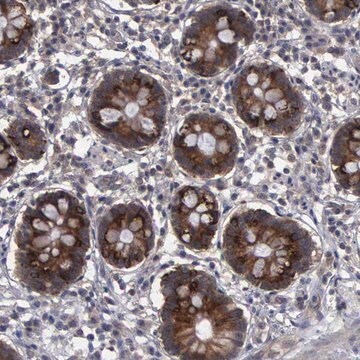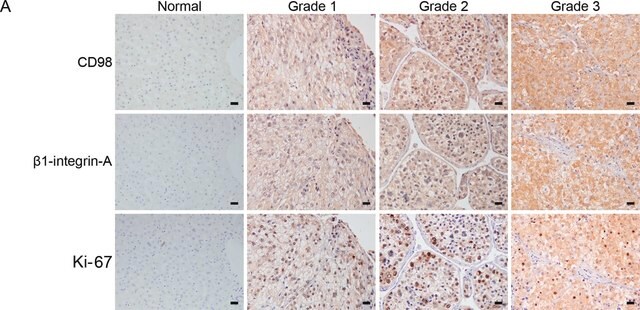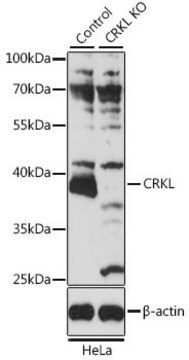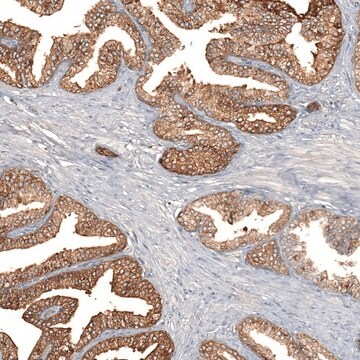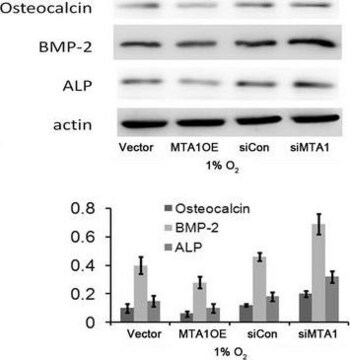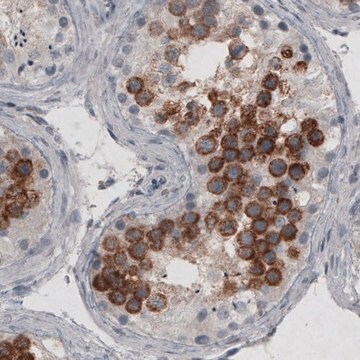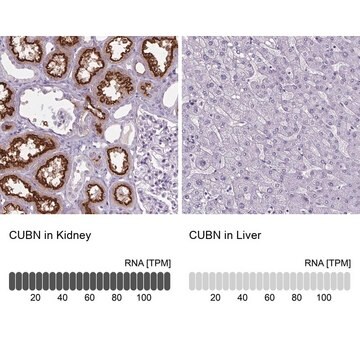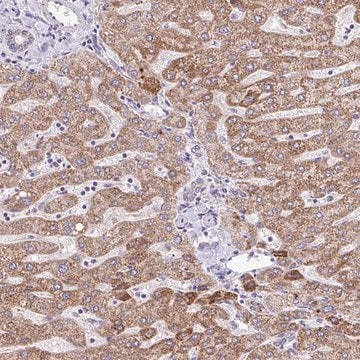추천 제품
생물학적 소스
rabbit
Quality Level
결합
unconjugated
항체 형태
purified immunoglobulin
항체 생산 유형
primary antibodies
클론
polyclonal
양식
buffered aqueous solution
분자량
antigen 73.81 kDa
종 반응성
human
기술
western blot: 1 μg/mL
NCBI 수납 번호
UniProt 수납 번호
배송 상태
dry ice
저장 온도
−20°C
타겟 번역 후 변형
unmodified
유전자 정보
human ... HAP1(9001)
일반 설명
Huntington′s disease (HD), a neurodegenerative disorder characterized by loss of striatal neurons, is caused by an expansion of a polyglutamine tract in the HD protein huntingtin. This gene encodes a protein that interacts with huntingtin, with two cytoskeletal proteins (dynactin and pericentriolar autoantigen protein 1), and with a hepatocyte growth factor-regulated tyrosine kinase substrate. The interactions with cytoskeletal proteins and a kinase substrate suggest a role for this protein in vesicular trafficking or organelle transport. Several alternatively spliced transcript variants encoding different isoforms have been described for this gene. (provided by RefSeq)
면역원
HAP1 (AAI56729.1, 1 a.a. ~ 671 a.a) full-length human protein.
Sequence
MRPKRLGRCCAGSRLGPGDPAALTCAPSPSASPAPEPSAQPQARGTGQRVGSRATSGSQFLSEARTGARPASEAGAKAGARRPSAFSAIQGDVRSMPDNSDAPWTRFVFQGPFGSRATGRGTGKAAGIWKTPAAYVGRRPGVSGPERAAFIRELEEALCPNLPPPVKKITQEDVKVMLYLLEELLPPVWESVTYGMVLQRERDLNTAARIGQSLVKQNSVLMEENSKLEALLGSAKEEILYLRHQVNLRDELLQLYSDSDEEDEDEEEEEEEKEAEEEQEEEEAEEDLQCAHPCDAPKLISQEALLHQHHCPQLEALQEKLRLLEEENHQLREEASQLDTLEDEEQMLILECVEQFSEASQQMAELSEVLVLRLENYERQQQEVARLQAQVLKLQQRCRMYGAETEKLQKQLASEKEIQMQLQEESVWVGSQLQDLREKYMDCGGMLIEMQEEVKTLRQQPPVSTGSATHYPYSVPLETLPGFQETLAEELRTSLRRMISDPVYFMERNYEMPRGDTSSLRYDFRYSEDREQVRGFEAEEGLMLAADIMRGEDFTPAEEFVPQEELGAAKKVPAEEGVMEEAELVSEETEGWEEVELELDEATRMNVVTSALEASGLGPSHLDMNYVLQQLANWQDAHYRRQLRWKMLQKGECPHGALPAASRTSCRSSCR
Sequence
MRPKRLGRCCAGSRLGPGDPAALTCAPSPSASPAPEPSAQPQARGTGQRVGSRATSGSQFLSEARTGARPASEAGAKAGARRPSAFSAIQGDVRSMPDNSDAPWTRFVFQGPFGSRATGRGTGKAAGIWKTPAAYVGRRPGVSGPERAAFIRELEEALCPNLPPPVKKITQEDVKVMLYLLEELLPPVWESVTYGMVLQRERDLNTAARIGQSLVKQNSVLMEENSKLEALLGSAKEEILYLRHQVNLRDELLQLYSDSDEEDEDEEEEEEEKEAEEEQEEEEAEEDLQCAHPCDAPKLISQEALLHQHHCPQLEALQEKLRLLEEENHQLREEASQLDTLEDEEQMLILECVEQFSEASQQMAELSEVLVLRLENYERQQQEVARLQAQVLKLQQRCRMYGAETEKLQKQLASEKEIQMQLQEESVWVGSQLQDLREKYMDCGGMLIEMQEEVKTLRQQPPVSTGSATHYPYSVPLETLPGFQETLAEELRTSLRRMISDPVYFMERNYEMPRGDTSSLRYDFRYSEDREQVRGFEAEEGLMLAADIMRGEDFTPAEEFVPQEELGAAKKVPAEEGVMEEAELVSEETEGWEEVELELDEATRMNVVTSALEASGLGPSHLDMNYVLQQLANWQDAHYRRQLRWKMLQKGECPHGALPAASRTSCRSSCR
생화학적/생리학적 작용
The gene HAP1 (huntingtin-associated protein 1) is a bifunctional enzyme that functions as a DNA repair enzyme as well as in redox activation of transcription factors. It binds to the Huntington′s disease (HD) protein huntingtin in a polyglutamine length-dependent manner. It associates with huntingtin via the cytoskeletal proteins dynactin and pericentriolar autoantigen protein 1 forming coiled-coils. It plays a role in vesicle trafficking by facilitating interactions among cytoskeletal, vesicular and motor proteins. It is an apurinic/apyrimidinic (AP) site-specific DNA repair endonuclease that removes the AP sites produced naturally or by cytotoxic drugs and radiation. It also has RNAse H activity and controls the redox state of certain proto-oncogene products, such as the transcription factor c-Jun. The HAP1 protein is a candidate for pathology associated with HD.
물리적 형태
Solution in phosphate buffered saline, pH 7.4
적합한 제품을 찾을 수 없으신가요?
당사의 제품 선택기 도구.을(를) 시도해 보세요.
Storage Class Code
10 - Combustible liquids
WGK
WGK 3
Flash Point (°F)
Not applicable
Flash Point (°C)
Not applicable
가장 최신 버전 중 하나를 선택하세요:
A role for the human DNA repair enzyme HAP1 in cellular protection against DNA damaging agents and hypoxic stress.
Walker LJ
Nucleic Acids Research, 22, 4884-4889 (1994)
Assignment of the huntingtin (Hdh) gene, the huntingtin associated protein (Hap1) gene, and the huntingtin interacting protein (Hip1) gene to rat chromosomes 14, 10, and 12 by radiation hybrid mapping and fluorescent in situ hybridization.
Zimdahl H
Cytogenetics and Cell Genetics, 94, 101-104 (2001)
Huntingtin-associated protein 1 (HAP1) interacts with the p150Glued subunit of dynactin.
Engelender S
Human Molecular Genetics, 6, 2205-2212 (1997)
L J Walker et al.
Molecular and cellular biology, 13(9), 5370-5376 (1993-09-01)
The DNA binding activity of the c-jun proto-oncogene product is inhibited by oxidation of a specific cysteine residue (Cys-252) in the DNA binding domain. Jun protein inactivated by oxidation of this residue can be efficiently reactivated by a factor from
자사의 과학자팀은 생명 과학, 재료 과학, 화학 합성, 크로마토그래피, 분석 및 기타 많은 영역을 포함한 모든 과학 분야에 경험이 있습니다..
고객지원팀으로 연락바랍니다.